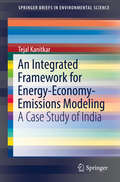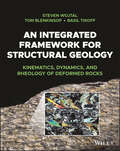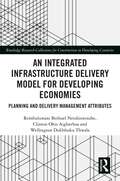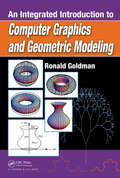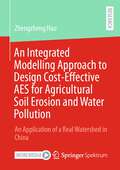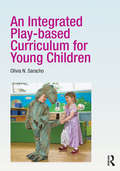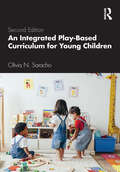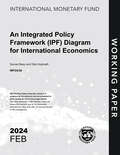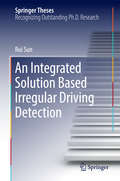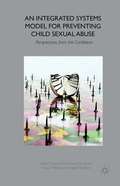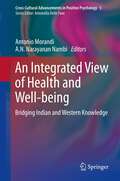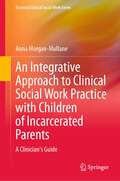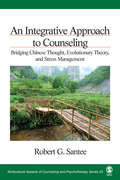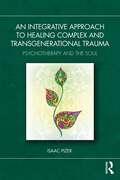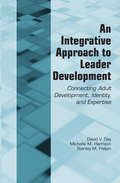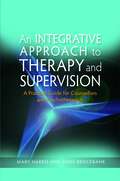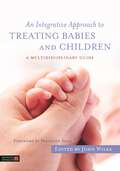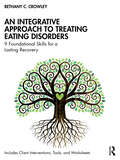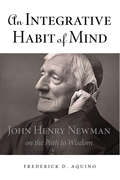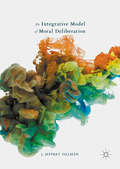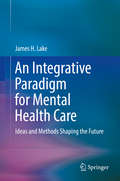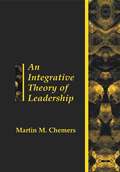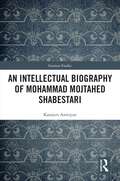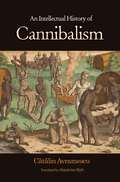- Table View
- List View
An Integrated Framework for Energy-Economy-Emissions Modeling: A Case Study of India (SpringerBriefs in Environmental Science)
by Tejal KanitkarThis book combines three different energy-economy-emissions modeling methodologies into one Integrated Modeling Framework (IMF) in an attempt to fill gaps in current modeling research as it applies to developing countries. Through the analysis of existing mathematical models, including large macro-economic models and technology-explicit energy models, the work proposes planning methodologies for developing countries that face challenges on their economy and infrastructure due to climate change. The three modeling methodologies discussed in the chapters are a decomposition analysis of trends in emissions intensity of GDP, linear programming techniques to determine optimum energy supply pathways given various resource and emissions constraints, and an input-output analysis to evaluate the impact of energy policies on income and equity. After a brief introduction to the history of the development of energy studies and the linkages between energy, economic, and environmental systems, the book delves into the component methodologies of the IMF and their intended outcomes. The decomposition analysis is intended to gauge the energy intensity of GDP and the structural composition of the economy to provide a basis on which scenarios are constructed in the following two methodologies. The linear programs are meant to develop a methodology to determine energy options under a variety of scenarios that capture the technical and economic characteristics of the power sector of developing countries. Lastly, the input-output analysis aims to build a methodology through which energy policy decisions can be understood and quantified to ensure the best possible impacts on developing economies and societies. Those who will be interested in this book include policy makers, academics, and students and professionals working on energy studies and energy-economy modeling.
An Integrated Framework for Structural Geology: Kinematics, Dynamics, and Rheology of Deformed Rocks
by Steven Wojtal Tom Blenkinsop Basil TikoffAN INTEGRATED FRAMEWORK FOR STRUCTURAL GEOLOGY A modern and practice-oriented approach to structural geology An Integrated Framework for Structural Geology: Kinematics, Dynamics, and Rheology of Deformed Rocks builds a framework for structural geology from geometrical description, kinematic analysis, dynamic evolution, and rheological investigation of deformed rocks. The unique approach taken by the book is to integrate these principles of continuum mechanics with the description of rock microstructures and inferences about deformation mechanisms. Field, theoretical and laboratory approaches to structural geology are all considered, including the application of rock mechanics experiments to nature. Readers will also find: Three case studies that illustrate how the framework can be applied to deformation at different levels in the crust and in an applied structural geology context Hundreds of detailed, two-color illustrations of exceptional clarity, as well as many microstructural and field photographs The quantitative basis of structural geology delivered through clear mathematics Written for advanced undergraduate and graduate students in geology, An Integrated Framework for Structural Geology will also earn a place in the libraries of practicing geologists with an interest in a one-stop resource on structural geology.
An Integrated Infrastructure Delivery Model for Developing Economies: Planning and Delivery Management Attributes (Routledge Research Collections for Construction in Developing Countries)
by Clinton Aigbavboa Wellington Didibhuku Thwala Rembuluwani Bethuel NetshiswinzheThis book explores the attributes of an integrated model for infrastructure delivery as a means to achieve high impact investing, sustainable growth and development in a developing economy. An Integrated Infrastructure Delivery Model for Developing Economies: Planning and Delivery Management Attributes is premised on the understanding that one of the most significant barriers to efficient and effective infrastructure delivery is the nature and extent of fragmentation in the ways in which infrastructure projects are planned, designed, and delivered. Using a Delphi method, the research presented in this book examines the infrastructure delivery models and practices that have been employed in South Africa and other developing countries, and in doing so presents eight attributes for integrated infrastructure delivery. These are: (i) developing a common vision for the community, (ii) stakeholder participation, (iii) integrated project development and scoping, (iv) access to planning information, (v) cross-sectoral planning, (vi) integrated infrastructure master plans, (vii) statutory and regulatory compliance and (viii) integrated contractual frameworks. The book presents a practical model that can serve as a guide and a manual for project planning and development to achieve integrated infrastructure delivery in developing economies. The proposed model should serve as a framework to inform future planning and programming of infrastructure projects within the public sector space. Furthermore, the application of the model will help resolve the problems of fragmentation and lack of coordination in how infrastructure projects are planned and implemented. This book will be beneficial to infrastructure practitioners, policymakers, researchers and academics who pursue best practice models to improve the delivery and management of infrastructure.
An Integrated Introduction to Computer Graphics and Geometric Modeling (Chapman & Hall/CRC Computer Graphics, Geometric Modeling, and Animation Series)
by Ronald GoldmanTaking a novel, more appealing approach than current texts, An Integrated Introduction to Computer Graphics and Geometric Modeling focuses on graphics, modeling, and mathematical methods, including ray tracing, polygon shading, radiosity, fractals, freeform curves and surfaces, vector methods, and transformation techniques. The author begins with f
An Integrated Modelling Approach to Design Cost-Effective AES for Agricultural Soil Erosion and Water Pollution: An Application of a Real Watershed in China
by Zhengzheng HaoAgri-environment schemes (AES) is frequently adopted for tricky environmental issues. One key concern for AES design is to optimize the cost-effectiveness. For issues of cost-effective prevention of agricultural soil erosion and non-point source water pollution, although models that assess both environmental effects and economic costs of land use measures have been developed, they typically adopt a planning perspective instead of designing AES with the role of farmers being considered. This book presents a spatially explicit novel integrated modelling approach that addresses the shortcoming by combining several components. The relevance of the modelling approach is demonstrated in this book by applying it to the Baishahe watershed in Shanxi province in China. The results show that the modelling approach is robust to design cost-effective AES, i.e. under given budget the maximum environmental effect in the study region could be attained with a set of designed payments for measures in AES. The developed modelling approach is generic and powerful for application in all kinds of agricultural watersheds with various sizes.
An Integrated Play-based Curriculum for Young Children
by Olivia N. SarachoPlay provides young children with the opportunity to express their ideas, symbolize, and test their knowledge of the world. It provides the basis for inquiry in literacy, science, social studies, mathematics, art, music, and movement. Through play, young children become active learners engaged in explorations about themselves, their community, and their personal-social world. An Integrated Play-Based Curriculum for Young Children offers the theoretical framework for understanding the origins of an early childhood play-based curriculum and how young children learn and understand concepts in a social and physical environment. Distinguished author Olivia N. Saracho then explores how play fits into various curriculum areas in order to help teachers develop their early childhood curriculum using developmentally and culturally appropriate practice. Through this integrated approach, young children are able to actively engage in meaningful and functional experiences in their natural context. Special Features Include: Vignettes of children’s conversations and actions in the classroom Suggestions for activities and classroom materials Practical examples and guidelines End-of-chapter summaries to enhance and extend the reader’s understanding of young children By presenting appropriate theoretical practices for designing and implementing a play-based curriculum, An Integrated Play-Based Curriculum for Young Children offers pre-service teachers the foundational knowledge about the field, about the work that practitioners do with young children, and how to best assume a teacher’s role effectively.
An Integrated Play-based Curriculum for Young Children
by Olivia N. SarachoAn Integrated Play-Based Curriculum for Young Children, Second Edition explores how to integrate play across the curriculum, helping teachers develop their early childhood curriculum using developmentally and culturally appropriate practice. Distinguished author Olivia N. Saracho offers a theoretical framework for understanding the origins of an early childhood play-based curriculum and illuminates how young children learn and understand concepts in a social and physical environment. This second edition has been fully updated throughout and its comprehensive coverage has been expanded with entirely new sections on technology and social media, cultural differences in play, and teaching ELLs and students with disabilities. Packed with vignettes, activities, and practical examples, this text is essential reading for pre-service teachers seeking appropriate theoretical practices for designing and implementing a play-based curriculum. Special Features Include: Suggestions and guidelines for activities and choosing classroom materials. Discussion of a full range of curriculum areas and topics including literacy, language, science, social studies, mathematics, art, music, blocks, and movement. Vignettes of children’s conversations and examples of how children learn through play. End-of-chapter summaries to enhance and extend an understanding of young children.
An Integrated Policy Framework (Imf Working Papers)
by GopinathA report from the International Monetary Fund.
An Integrated Solution Based Irregular Driving Detection (Springer Theses)
by Rui SunThis thesis introduces a new integrated algorithm for the detection of lane-level irregular driving. To date, there has been very little improvement in the ability to detect lane level irregular driving styles, mainly due to a lack of high performance positioning techniques and suitable driving pattern recognition algorithms. The algorithm combines data from the Global Positioning System (GPS), Inertial Measurement Unit (IMU) and lane information using advanced filtering methods. The vehicle state within a lane is estimated using a Particle Filter (PF) and an Extended Kalman Filter (EKF). The state information is then used within a novel Fuzzy Inference System (FIS) based algorithm to detect different types of irregular driving. Simulation and field trial results are used to demonstrate the accuracy and reliability of the proposed irregular driving detection method.
An Integrated Systems Model for Preventing Child Sexual Abuse
by Adele D. Jones Ena Trotman Jemmott Priya E. Maharaj Hazel Da BreoThis book sets out an integrated systems model which utilizes a public health approach and 'whole of society' philosophy for preventing and responding to child sexual abuse. It guides those engaged in policy, practice and planning concerning gender based violence and child abuse towards a more systemic approach to tackling these problems.
An Integrated View of Health and Well-being: Bridging Indian and Western Knowledge (Cross-Cultural Advancements in Positive Psychology #5)
by A.N.Narayanan Nambi Antonio MorandiConcepts like Health and Well-being are not exclusive products of the Western culture. Research has widely demonstrated that the representation of the body and of its pathologies, as well as treatment and healing practices vary across cultures in relation to social norms and beliefs.The culture of India is a melting pot of nine main Darshanas, or philosophical systems, that share the common core of a realization of the self in society. India's traditional health system, Ayurveda, is a result of the practical application of the Darshanas to the observation of human nature and behavior. Ayurveda conceptualizes health, disease and well-being as multidimensional aspects of life, and it seeks to preserve a balance in individuals among their biological features, their psychological features and their environmental demands. The Ayurveda approach to health is remarkably similar to the eudaimonic conceptualization of well-being proposed by positive psychology, and the basic tenets of Ayurveda are deeply consistent with the latest developments of modern physics, which stresses the substantial interconnectedness among natural phenomena and their substrates. This text shows how the approach to health developed in Ayurveda can be fruitfully integrated in a general view of health and well-being that encompasses cultural and ideological boundaries. Specifically, it details the conceptualization of health as an optimal and mindful interaction between individuals and their environment.
An Integrative Approach to Clinical Social Work Practice with Children of Incarcerated Parents: A Clinician's Guide (Essential Clinical Social Work Series)
by Anna Morgan-MullaneThis book is an essential clinician's guide to understanding, unpacking, treating, and healing individual, familial, and communal wounds associated with parental incarceration. Readers gain familiarity with integrative micro and macro healing techniques and modalities that are currently being utilized as anti-racist, anti-oppressive, and innovative practices. They also develop an understanding of and deeper unpacking of their own biases within the therapeutic relationship. The book offers an extensive overview of clinical practice models such as trauma-focused cognitive behavioral therapy, narrative therapy, and relational and attachment-based therapy for treating trauma symptoms associated with children of incarcerated parents, their families, and their surrounding communities. The author provides guidance on healing complex trauma through phase-oriented, multimodal, and skill-focused treatment approaches, with emphasis on strengthening one's own narrative of power and pain while building community in supportive spaces. Among the topics covered:Why Criminal Justice Is Relevant to All Clinical PractitionersImpact of Secondary Incarceration: Collateral Consequences for Children and FamiliesPsychosocial Stressors for Children of Incarcerated Parents: Conspiracy of Silence and Ambiguous LossSupervision and the Therapeutic Alliance: Critical Consciousness and Anti-racist Clinical Training and UndoingClinical Partnership: Application of Dismantling Anti-Blackness Through Anti-oppressive Practice and Critical ConsciousnessAn Integrative Approach to Clinical Social Work Practice with Children of Incarcerated Parents enhances therapeutic relationships for social workers, teaches innovative clinical practices most effective for this population, and offers a comprehensive discussion and understanding of the complex traumas faced both historically and presently by children and families impacted by the criminal justice system. Although designed to inspire and train social workers, the guide has significantly wide-ranging application for mental health and medical providers and other clinicians interested in enhancing their work with children and families impacted by the criminal justice system in diverse clinical practice settings. Lay practitioners and policymakers within government and not-for-profit settings also will find the book of interest.
An Integrative Approach to Counseling: Bridging Chinese Thought, Evolutionary Theory, and Stress Management
by Robert G. SanteeAn Integrative Approach to Counseling: Bridging Chinese Thought, Evolutionary Theory, and Stress Management offers a global and integrative approach to counseling that incorporates multiple concepts and techniques from both eastern and western perspectives. The book identifies commonalities rather than the differences between them. The book also compares and contrasts the underlying cultural assumptions of western counseling with those of the Chinese perspectives of Confucianism, Daoism, and Buddhism, relative to integrating and applying a more global approach to helping individuals functionally adapt to challenges in their environments. The book will be used by faculty and students in those advanced undergraduate and graduate courses in psychology, counseling, or social work that cover such areas as introduction to counseling, counseling skills and techniques, counseling theories, multi-cultural awareness and counseling, and stress management.
An Integrative Approach to Healing Complex and Transgenerational Trauma: Psychotherapy and the Soul
by Isaac PizerThis book presents an integrative relational approach to treating trauma and psychological entanglements through autobiographical, philosophical and clinical reflections on the transgenerational dimension of the human experience and the self as an irreducible core of the person.The book commences with the author’s own journey growing up in a Jewish family deeply affected by transgenerational trauma from the Holocaust, providing an inspiring and reflective backdrop to this book’s contents. Isaac Pizer then describes and explains his philosophy of therapy, which holds psychotherapy and the treatment of trauma as a relational process that requires an inclusive awareness of the following dimensions of human experiencing: the physical, intrapsychic, relational, transgenerational, transpersonal. Exploring a psychotherapy that holds and integrates transgenerational awareness in the treatment of complex trauma, this book is supplemented with case studies and the author’s own experiences.This compelling and thought-provoking book is intended for therapists, therapists in training and people seeking knowledge and encouragement in their journeys of personal and collective healing, self-realisation and personal growth.
An Integrative Approach to Leader Development: Connecting Adult Development, Identity, and Expertise
by David V. Day Michelle M. Harrison Stanley M. HalpinThis book is a beginning, a first step, in taking leader development in organizations beyond conventional wisdom toward a scientifically sound research-based set of principles and practices. The authors looked beyond their own academic disciplines to bring to bear accumulated wisdom from researchers who have developed well-established and accepted
An Integrative Approach to Successional Dynamics
by Meiners, Scott J. and Pickett, Steward T. A. and Cadenasso, Mary L. Scott J. Meiners Pickett, Steward T. A. Mary L. CadenassoMuch of what is considered conventional wisdom about succession is not as clear cut as it is generally believed. Yet, the importance of succession in ecology is undisputed since it offers a real insight into the dynamics and structure of all plant communities. Part monograph and part conceptual treatise, An Integrative Approach to Successional Dynamics presents a unifying conceptual framework for dynamic plant communities and uses a unique long-term data set to explore the utility of that framework. The fourteen chapters, each written in a nontechnical style and accompanied by numerous illustrations and examples, cover diverse aspects of succession, including: community, population and disturbance dynamics, diversity, community assembly, heterogeneity, functional ecology and biological invasion. This unique text will be a great source of reference for researchers and graduate students in ecology and plant biology and others with an interest in the subject.
An Integrative Approach to Therapy and Supervision: A Practical Guide for Counsellors and Psychotherapists
by Mary Harris Anne BrockbankAn Integrative Approach to Therapy and Supervision presents an innovative and flexible model for therapy and supervision practice. The model draws on ideas from the psychological traditions of Transactional Analysis, Gestalt theory and Cognitive Behavioural Therapy to develop an integrated approach to working with clients and to developing a supervisor-supervisee relationship that can be adapted to suit the needs of individual personalities and situations. The authors lay out the theory underlying the model, how it relates to existing models of supervision, and demonstrate how the model works in practice using case material to illustrate the range of approaches that can be applied in a given scenario. This book is essential reading for both new and experienced practitioners, as well as those responsible for training therapists, counsellors and supervisors.
An Integrative Approach to Treating Babies and Children: A Multidisciplinary Guide
by Michael Shea Franklyn Sills Ann Diamond Weinstein John Wilks Anita Hegerty David Haas Dr Carolyn Goh Graham Kennedy Matthew Appleton Professor Franz Ruppert Thomas HarmsWorking with babies and children is most successful when therapists have a complete understanding and overview of all appropriate treatment options, and the effects of early influences on child health and development. This book shows therapists how to consider these factors in order to work more effectively within their individual areas of expertise. Contributors from a wide range of disciplines explore the influence of pregnancy, birth and family dynamics on the physical and mental health of babies and children. They show how these factors relate to common complaints, such as excessive and different types of crying, chronic illnesses and poor immune systems, and behavioural and attachment issues, and how complementary approaches can be best applied to treat these issues. This book also offers helpful advice for working within multidisciplinary teams. Illustrated with case studies and including examples from current research, this book is a valuable resource for therapists from diverse disciplines.
An Integrative Approach to Treating Eating Disorders: 9 Foundational Skills for a Lasting Recovery
by Bethany C. CrowleyAn Integrative Approach to Treating Eating Disorders walks therapists through how to effectively resolve the most common yet nuanced struggles that clients with disordered eating face on a daily basis.This straightforward workbook begins by demystifying the complexities and nuances of eating disorders. It then helps therapists understand the need for an integrative approach and walks them through how to assess a client’s biological, psychological, social, and spiritual domains as they correlate with disordered eating behaviors and thoughts. This is accomplished with the BASIC I.D. assessment model and a multimodal therapy framework, both created by Dr. Arnold Lazarus. Nine foundational skills are provided for clients to achieve lasting recovery and avoid the all-too-common relapse rate of eating disorders.Each foundational skill is presented in its own chapter, complete with data, case vignettes, worksheets, and exercises developed over twenty years of research and client management. With this book, therapists both new and experienced will boost their confidence, gain practical tools, and bring more efficiency to their individual or group sessions.
An Integrative Habit of Mind: John Henry Newman on the Path to Wisdom
by Frederick AquinoSearching for better ways to inspire people to pursue wisdom, Frederick D. Aquino argues that teachers and researchers should focus less on state-of-the-art techniques and learning outcomes and instead pay more attention to the intellectual formation of their students. We should, Aquino contends, encourage the development of an integrative habit of mind, which entails cultivating the capacity to grasp how various pieces of data and areas of inquiry fit together and to understand how to apply this information to new situations. To fully explore this notion, An Integrative Habit of Mind brings the work of the great religious figure and educator John Henry Newman into fruitful conversation with recent philosophical developments in epistemology, cognition, and education. Aquino unearths some crucial but neglected themes from NewmanÆs writings and carries them forward into the contemporary context, revealing how his ideas can help us broaden our horizons, render apt judgments, and better understand our world and how we think about it.
An Integrative Model of Moral Deliberation
by J. Jeffrey TillmanAn Integrative Model of Moral Deliberation suggests that the inadequacy of models of moral deliberation to deal effectively with contemporary moral complexity is a result of the lack of an inadequate theory of moral cognition. Drawing from work in neuroscience, evolutionary psychology, social theory, dual process cognitive theory, and the work of William James, this book develops a theory of moral cognition to be used as the basis for a model of moral deliberation. This model portrays moral deliberation as a back and forth movement between intuitive and analytic cognitions, by which narrative scenarios are constructed and then assessed by aesthetic sensibilities.
An Integrative Paradigm for Mental Health Care: Ideas and Methods Shaping the Future
by James H. LakeThis crucial volume provides a concise overview of the conceptual foundations and clinical methods underlying the rapidly emerging subspecialty of integrative mental healthcare. It discusses methods for guiding practitioners to individualized integrative strategies that address unique symptoms and circumstances for each patient and includes practical clinical techniques for developing interventions addressed at wellness, prevention, and treatment. Included among the overview:Meeting the challenges of mental illness through integrative mental health care.Evolving paradigms and their impact on mental health careModels of consciousness: How they shape understandings of normal mental functioning and mental illnessFoundations of methodology in integrative mental health careTreatment planning in integrative mental health careThe future of mental health careA New Paradigm for Integrative Mental Healthcare is relevant and timely for the increasing numbers of patients seeking integrative and alternative care for depressed mood, anxiety, ADHD, bipolar disorder, schizophrenia, and other mental health problems such as fatigue and chronic pain. “Patients are crying out for a more integrative approach, and this exemplary book provides the template for achieving such a vision.” -Jerome Sarris, MHSc, PhD, ND“For most conventionally trained clinicians the challenge is not “does CAM work?” but “how do I integrate CAM into my clinical practice?” Lake’s comprehensive approach answers this central question, enabling the clinician to plan truly integrative and effective care for the mind and body.”-Leslie Korn, PhD, MPH
An Integrative Theory of Leadership (Social Psychology Ser.)
by Martin ChemersA definition of leadership that would be widely accepted by the majority of theorists and researchers might say that "leadership is a process of social influence in which one person is able to enlist the aid and support of others in the accomplishment of a common task." The major points of this definition are that leadership is a group activity, is based on social influence, and revolves around a common task. While this specification seems relatively simple, the reality of leadership is very complex. Intrapersonal factors (thoughts and emotions) interact with interpersonal processes (attraction, communication, and influence) to have effects on a dynamic external environment. Each of these aspects brings complexity to the leadership process. It is the purpose of this book to make that complexity a bit more manageable, increasing the ability to understand what effective leadership is. This volume offers a comprehensive analysis and integration of the empirical research literature and major theories of leadership. It employs a functional analysis stressing what leaders must do to be effective and specifies the processes related to each function. The chapters provide an extensive review of the major approaches to leadership. Each chapter is discussed with an eye to explaining the basic principles, the research evidence, and where appropriate, the relationship of the theory or research program to other theories. In addition, this volume offers the most comprehensive treatment of cultural and gender factors in leadership of any recent book. The question of male-female differences in leadership style and performance is carefully analyzed against the empirical findings. The ultimate goal of this review of the literature is to provide a basis for the presentation of an integrative model of leadership that brings together function and process and provides an armature for integrating what is known.
An Intellectual Biography of Mohammad Mojtahed Shabestari (Iranian Studies)
by Katajun AmirpurThis monograph details the life and ideas of Mohammad Mojtahed Shabestari, the leading representative of secular Islam among the Iranian clergy and a pioneer of the Post-Islamist Movements in Iran.Shabestari stands as the leading representative of secular Islam among the Iranian clergy, advocating for a progressive interpretation of Islamic thought that aligns with modern secular values. This biography delves into Shabestari's intellectual journey, tracing his evolution from a traditional cleric to a pioneering figure in the Post-Islamist Movements in Iran. The book meticulously examines Shabestari's philosophical and theological contributions, highlighting his efforts to reconcile faith with reason and democracy. It provides an in-depth analysis of his seminal works, illustrating his critical stance on authoritarian interpretations of Islam and his advocacy for human rights and individual freedoms within an Islamic framework. By shedding light on his unique perspectives and the socio-political context in which he operates, this biography offers readers a nuanced understanding of Shabestari's impact on contemporary Islamic thought and the broader movement towards secularism in Iran.The book is an essential read for those interested in Middle Eastern studies, Islamic theology, and the ongoing discourse on the role of religion in modern society.
An Intellectual History of Cannibalism
by Cătălin AvramescuThe cannibal has played a surprisingly important role in the history of thought--perhaps the ultimate symbol of savagery and degradation-- haunting the Western imagination since before the Age of Discovery, when Europeans first encountered genuine cannibals and related horrible stories of shipwrecked travelers eating each other. An Intellectual History of Cannibalism is the first book to systematically examine the role of the cannibal in the arguments of philosophers, from the classical period to modern disputes about such wide-ranging issues as vegetarianism and the right to private property. Catalin Avramescu shows how the cannibal is, before anything else, a theoretical creature, one whose fate sheds light on the decline of theories of natural law, the emergence of modernity, and contemporary notions about good and evil. This provocative history of ideas traces the cannibal's appearance throughout Western thought, first as a creature springing from the menagerie of natural law, later as a diabolical retort to theological dogmas about the resurrection of the body, and finally to present-day social, ethical, and political debates in which the cannibal is viewed through the lens of anthropology or invoked in the service of moral relativism. Ultimately, An Intellectual History of Cannibalism is the story of the birth of modernity and of the philosophies of culture that arose in the wake of the Enlightenment. It is a book that lays bare the darker fears and impulses that course through the Western intellectual tradition.
